More supporters of nuclear weapons in Belarus - survey

Narratives of state propaganda have reached some people after all / Collage by Ulad Rubanau, Euroradio
Seventy-five percent of urban Belarusians are against the placement of nuclear weapons in the country. However, in March 2022 such an idea was supported by 20%, and in March 2023 it was already supported by 25% of respondents. The audience of the state media is more often in favor of nuclear weapons.
These are the results of the Chatham House survey "Belarusians' attitudes to the war and value orientations", conducted from March 15 to 27 among urban residents of Belarus. The researchers learned that people often live in their own world, where the majority supposedly shares their views. Moreover, Belarusians don't want a "strong hand of leadership".
Euroradio reports on the most interesting part of the study.
The respondents were divided into four groups, depending on which media they get their information from. The first group is the public that uses state and non-state mass media (26%). The second group prefers non-state media (18%). The third group gets news only from state media (37%). As many as 19% of respondents sometimes use both sources of information.
Belarusians still do not want to fight
In March, 44% of all respondents said that they did not support the actions of the Russian army in Ukraine. Another 24% found it difficult to answer. A third still approve of the Russian invasion. Opinions have changed little since June 2022. Only in the group that uses government sources of information does the majority (53%) support Russia.
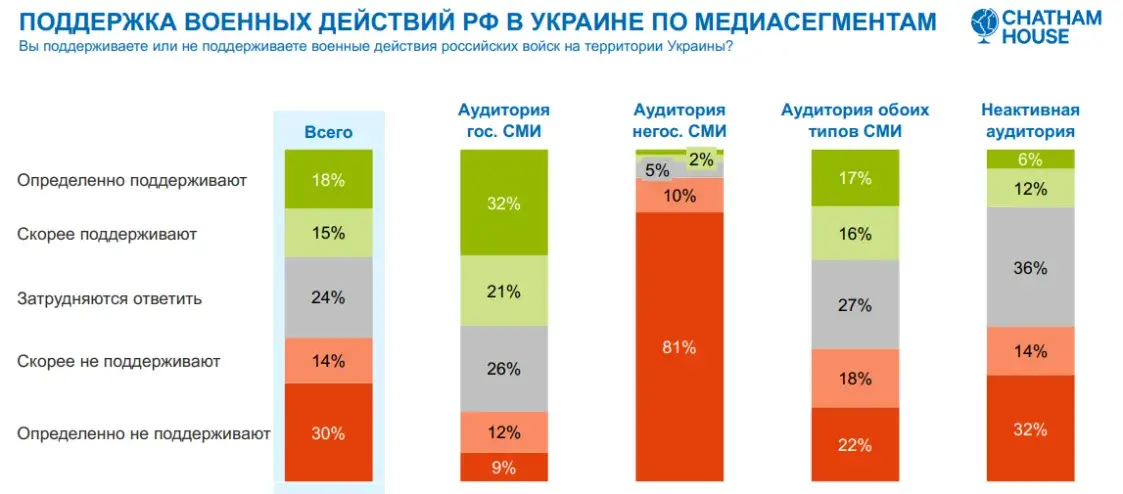
Respondents very rarely support Belarus' participation in the war on anyone's side. Since August 2022, the share of those who think that Belarus should support Russia but not get involved in a military conflict has increased slightly - from 25% to 30%. Six percent are in favor of supporting Ukraine but against taking part in the war (+2 percentage points since August). The share of neutral supporters has also increased slightly - from 28% to 30%.
At the same time, 22% do not know at all how Belarus should behave in this conflict.
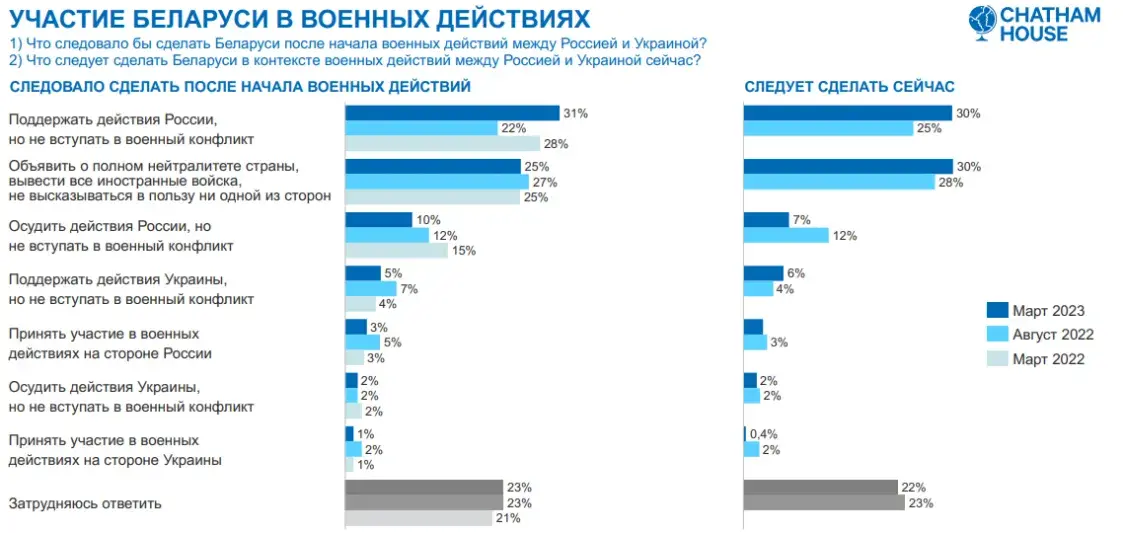
"A significant part of the support for Russia in Belarusian society comes at the expense of the position of the state mass media audience. By contrast, all other audiences tend to distance themselves from the war, choosing neutrality or finding it difficult to react," Chatham House notes.
One's own opinion seems to be the majority opinion
Since March 2022, people have become more pessimistic about Ukraine's chances of winning the war. In the latest poll, 15% said that Ukraine would win (-6 p.p. compared to last year). Forty-six percent think Russia will win (+1 p.p.). And 39% are undecided (+4 p.p.).
At the same time, 56% of Belarusians are in favor of an immediate end to the war and peace talks. Fourteen percent believe that the war should end only when Ukraine achieves its goals. Another 26% believe that the war should end when Russia is satisfied.
In most cases, those who rarely open the media are simply in favor of ending the war. The audience of the state media is the most in favor of achieving Russia's goals in the war. The opposite view is usually held by the audience of non-state media.
"Supporters of each of the views on possible options for ending the war believe that they are in the majority. This view of the supporters of achieving the goals of Ukraine and Russia can be explained by their confinement to information echo chambers," the researchers note.
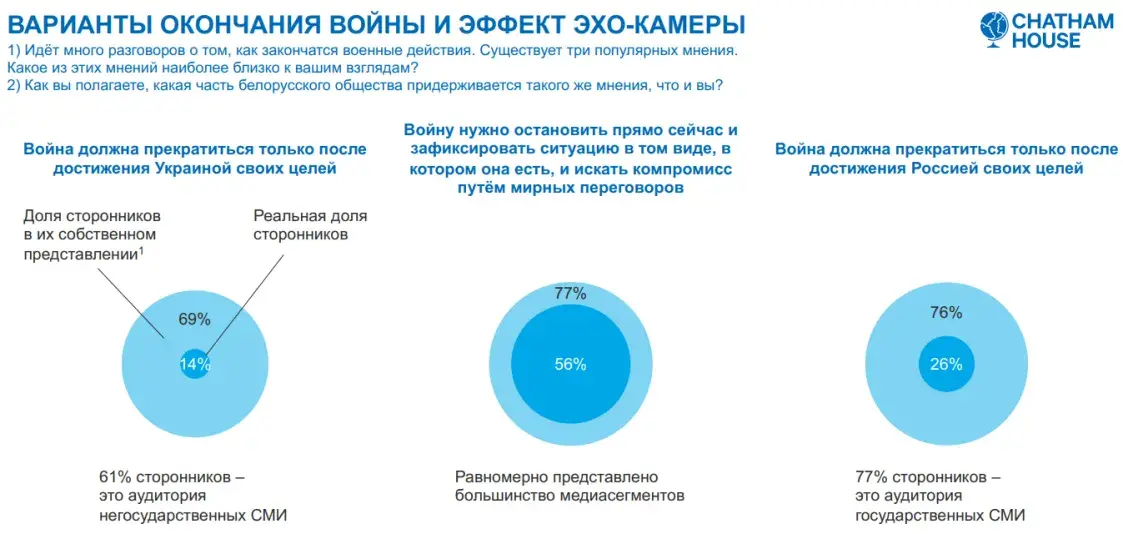
Belarusians, as in previous waves of surveys, often choose neutrality in foreign policy or friendship with all. However, in comparison with September 2020, the share of those who would like to have alliances with Russia and the EU at the same time has significantly decreased. Back then, the share of those who held such an opinion was 41%, while in the latest poll it was only 25%.
The number of those who are against any alliance at all is 23%. The same result was obtained in September 2020. The share of supporters of a union with Russia is 38%, while in the fall of 2020 it was only 27%. Fourteen percent of respondents want to join the EU (+5 p.p.).
The audience of state media is more often oriented towards Russia, and the audience of non-state non-state mass media - towards the EU.
Respondents more often perceive the union with Russia as a common economic space without political unification (36%). In second place is a free trade zone (34%).
Have nuclear weapons become less frightening?
The majority of respondents stably oppose the placement of nuclear weapons in Belarus. Twenty-five percent of respondents are in favor of nuclear weapons in the country. This is 5 percentage points more than in March 2022. The state media audience is most often in favor of nuclear weapons - 43%.
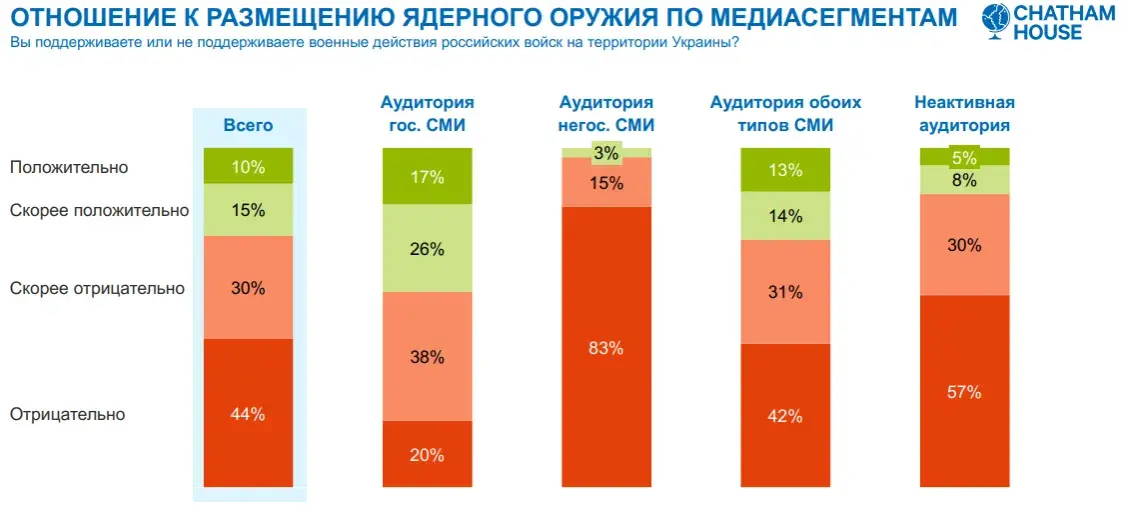
The researchers also asked questions about domestic policy. The responses showed that only 24% of urban residents believe that "the country needs a strong hand of a leader who must make important state decisions alone".
"Approximately the same number of people are opposed to the market transformation of the economy," Chatham House notes.
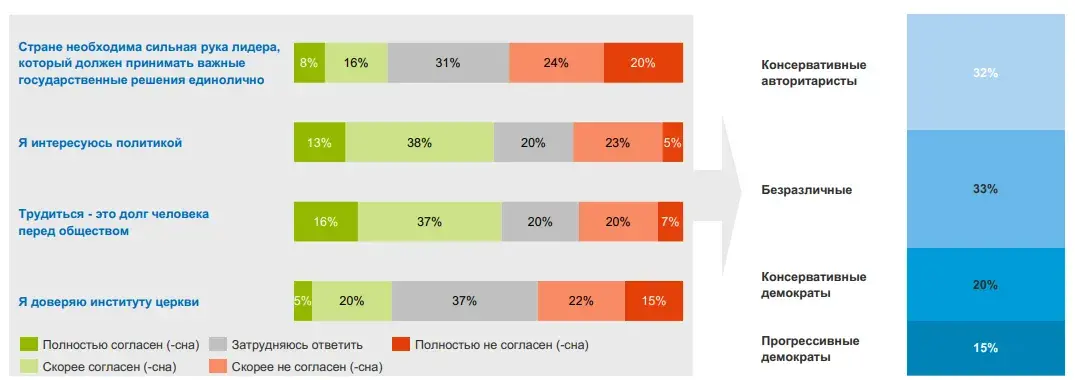
According to their political values, Belarusian urban residents can be divided into four segments: conservative authoritarians (32%), indifferent (33%), conservative democrats (20%), progressive democrats (15%).
***
Chatham House interviewed 804 respondents. The sample corresponds to the structure of the urban population of Belarus and is adjusted for gender, age, size of settlement, and level of education. The survey was conducted through online interviews (CAWI), i.e. the sample was limited to Internet users. At the beginning of 2023, 87% of Belarusians use the Internet.
The statistical error of the sample does not exceed 3.5%. Due to rounding, the sum of response percentages in the graphs may not equal 100%.















